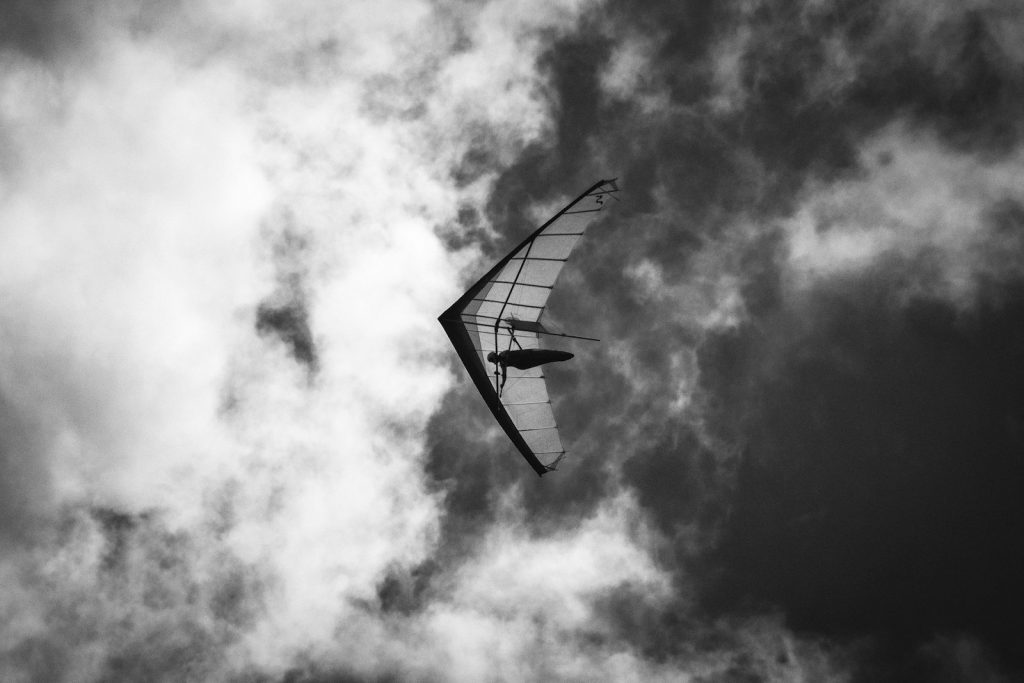Many years ago I was living in Providence, Rhode Island. A severe hurricane came up the coast and battered New England. I moved the crib of my baby against the wall and covered the crib so that if windows were broken the glass wouldn’t hit the baby, and we made other appropriate preparations. But we were directly in the path of the hurricane, and it was fierce. In front of the house we could see enormous old trees cracking and falling over.
Then after three or four hours, it became quiet. The sun came out, and the birds started to sing. The wind ceased. We were in the eye of the hurricane. In another hour or so, the eye had moved on, the winds began again, and we went through the other side of the whirling mass of winds. Eventually we were left with a huge mess to clean up. I learned later that sometimes pilots are accidentally caught in hurricanes, subjecting the plane and themselves to terrible stresses. When this happens, they often try to fly into the center, the eye of the hurricane, to give themselves a little chance to recover.
Most of us are like the pilot in the plane, just holding on, hoping we’ll make it out of the storm. We feel ourselves caught up in the buffetings of life. These may be natural occurrences, such as severe illness. They may be difficulties in relationships, which can seem quite unfair. From birth to death, we’re caught in this swirling of winds, which is really what life is: an enormous energy, moving and changing. Our aim is like that of the pilot: to protect ourselves and our plane. There is this enormously powerful thing we call our life, and we’re somewhere sitting in the middle of it in our little plane, hoping to make our way through without being hurt.
Suppose that instead of being in a plane, we were in a glider in the middle of the hurricane, without the control and power that an engine provides. We’re caught in the sweeping winds. If we have any idea that we’re going to get out alive, we’re foolish. Still, as long as we live within that enormous mass of wind, we have a good ride. Even with the fear and terror, it can be exhilarating and joyful—like riding a roller coaster.
As we live our lives, and as we do zazen, we’re trying to protect ourselves. This mind that thinks, pictures, gets excited, gets emotional, blames other people, and feels like a victim is like the pilot in the airplane who’s trying desperately to make his way through the hurricane. In such a life of tension and constriction, it takes everything we have just to survive. All of our attention is on ourselves and our control panel; in trying to save ourselves, we don’t notice anything else. But the man in the glider can enjoy everything—the lightning, the warm rain, the scream of the wind. He can have a great time.
Like the first pilot, we spend our lives trying to protect ourselves. The more intent we are upon protecting ourselves from the buffeting of our current situation, the more stress we feel, the more miserable we are, and the less we truly experience our lives. We must ignore most of the landscape if we’re obsessed with our control panels, which will fail us sooner or later in any case.
Nothing in the world will ever protect us: not our partner, not our life circumstances, not our children. After all, other people are busy protecting themselves. If we spend our life looking for the eye of the hurricane, we live a life that is fruitless.
We come to sesshin hoping that within the hurricane of our own turmoil, we’re going to find the little eye, the little nirvana. We think: “It must be somewhere. Where is it? Where is it?” Sometimes we hit a little spot of quiet, of good feelings. Then we try to cling to it. But we can’t hold onto the eye of a hurricane. Nothing in the world will ever protect us: not our partner, not our life circumstances, not our children. After all, other people are busy protecting themselves. If we spend our life looking for the eye of the hurricane, we live a life that is fruitless. We die without having really lived.
Of course it’s fine to buy life insurance and make sure the brakes work on our car. But in the end, even those don’t save us; sooner or later, all of our protective mechanisms will fail. Life is not a safe space. It never was, and it never will be. If we’ve hit the eye of the hurricane for a year or two, it still cannot be counted on. There is no safe space, not for our money, not for ourselves, not for those we love. And it’s not our business to worry about that.
Until we see through the game that doesn’t work, we don’t play the real game. Some people never see through it and die without ever having lived. And that’s too bad. We can spend our life blaming other people, circumstances, or our bad luck and thinking about the way life should have been. We can die that way if we want. That’s our privilege, but it’s not much fun. We have to open up to the enormous game going on that we’re part of. Our practice must be careful, meticulous, patient. We have to face everything.
⧫
Excerpted and adapted from Nothing Special by Charlotte Joko Beck and reprinted with permission from HarperOne, an imprint of HarperCollins Publishers. Copyright 1994 (trade paperback edition)
Thank you for subscribing to Tricycle! As a nonprofit, we depend on readers like you to keep Buddhist teachings and practices widely available.
